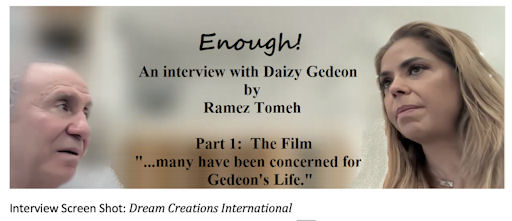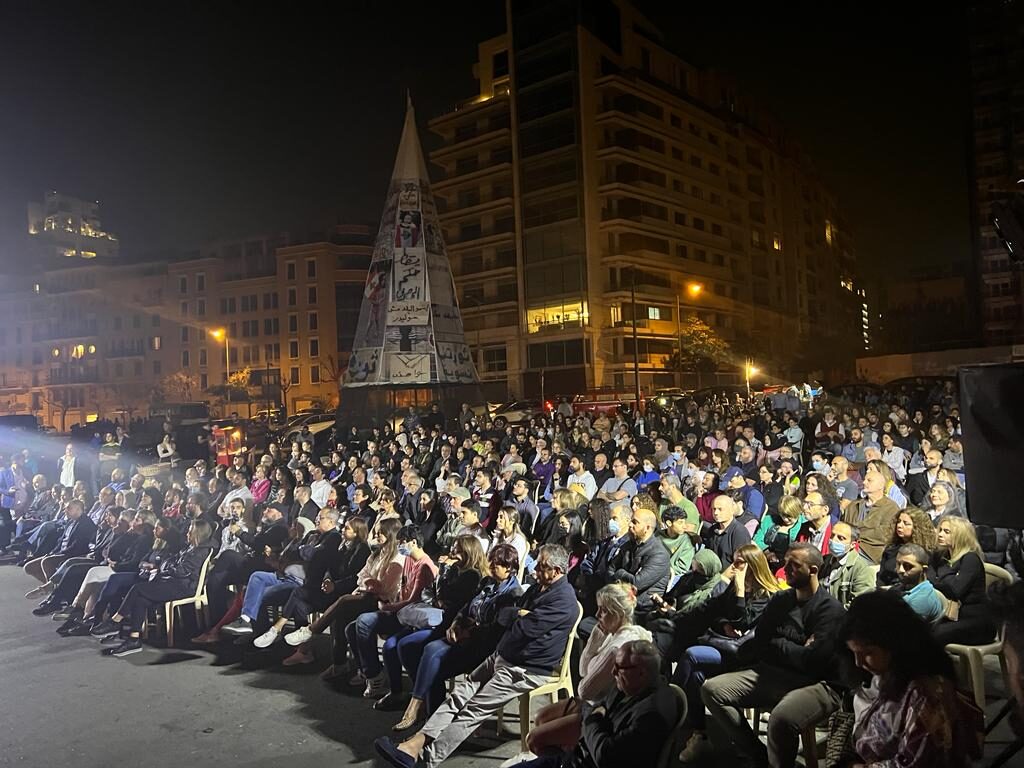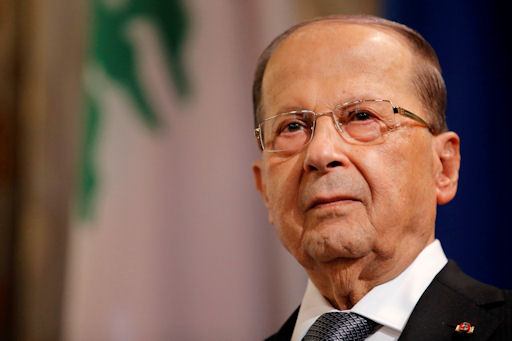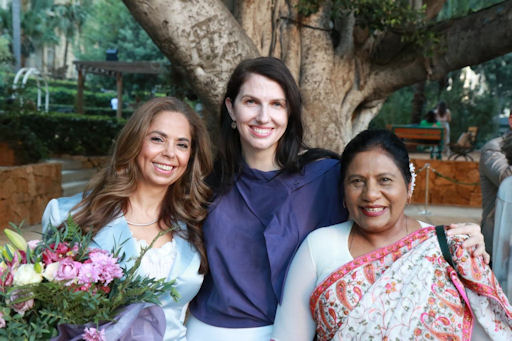 Lebanon has free-fallen from a robust bastion of capitalism and visionary democracy to a corrupt failed state incapable of maintaining a banking system or stable electricity for its streets, businesses, and homes.
Lebanon has free-fallen from a robust bastion of capitalism and visionary democracy to a corrupt failed state incapable of maintaining a banking system or stable electricity for its streets, businesses, and homes.
How did this happen and what can be done to resuscitate this ruined country once known as the Switzerland of the Middle East?
On Oct. 28, 2022, Daizy Gedeon and Ramez Tomeh met at a café in Beirut. Gedeon had just flown in from a meeting in London and Tomeh was on his way to the airport for film production work in Malta. They met to discuss Gedeon’s boldly candid film on politics in Lebanon, “Enough! Lebanon’s Darkest Hour.” Based on the film’s starkly honest and condemning research, many have been concerned for Gedeon’s life.
Tomeh, a Syrian-American international financial advisor, film producer and an old American University of Beirut friend of mine, is now based in Lebanon. He recorded their meeting. I have transcribed their conversation and divided it into a revealing three-part report: The Film, The Politicians and The Solution.

Tomeh: How come your film, “Enough! Lebanon’s Darkest Hour,” hasn’t gotten world-wide distribution?
Gedeon: I don’t know what’s going on. In Australia it’s been distributed. Big season.
Here in Lebanon, we released it in all the cinemas seven weeks prior to the 2022 election. We gave it to the people for free and then we did a tour around Lebanon. We took it to where people couldn’t get to cinemas, doing outdoor screenings in 15 locations. Tens of thousands of people watched the film.

Outdoor screening in Martyr’s Square, 2022.
Photo credit: Dream Creations International
We also gave it for free to Lebanese TV. We wanted everyone in Lebanon to watch it prior to the 2022 election.
The budget of the film was around $1.8 million, and it’s been in 40 film festivals around the world. Festivals are still approaching us now, nearly two years after its official launch at the Cannes International Film Festival in July 2021. It has a global audience, and we have three distributors. We are still planning screenings across Europe, USA, Canada, Latin America and other parts of the world later in 2023.
The Middle East distributor really wanted to launch it across the Middle East, but they found that the governments were anti anything Lebanon. In Dubai we couldn’t screen it, even though it was approved. Saudi Arabia, Egypt… there has been a blackout on anything Lebanese. They didn’t want problems.
Tomeh: What kind of problems were they worried about?
Gedeon: The film focuses on the people using their democratic right to vote to overturn the government. In many Middle Eastern countries, citizens are not encouraged to vote. They are not true democracies like Lebanon, and they definitely don’t want the people to use their power, so they discouraged or restricted the film because it rallies people to step up and stand up for their rights.
Tomeh: While you were filming, and afterwards, did you receive any threats?
Gedeon: Not during filming. I tried to get interviews with President Aoun and political party leaders like Walid Jumblatt, Sayed Hassan Nasrallah, Nabih Berri and others, but all said no. And that was in the beginning, when I thought I was making a film that would show the resurgence of Lebanon after the war. Since I wasn’t going in for an attack, I was intrigued about why they refused, especially Aoun.
When I did my first film in the 1990s, I was a very pro-Aoun supporter. I had interviewed him several times. He was a hero in my prior film, so I didn’t understand why I was blocked this time. Maybe they were afraid about what he would reveal.

Michel Naim Aoun served as Lebanon’s President
from Oct. 31, 2016, to October 30, 2022.
Photo credit: Dream Creations International
After the film was released at the Fort Lauderdale International Film Festival in Florida, within an hour I was hacked. My FB and website were hacked and this all affected our launch of the film in Australia that was scheduled three weeks later.
We have 53,000 followers on FB. In Australia the leaders of the community that I had been working with for 30 years told me: “We can’t back it.” There is no doubt they were told not to be present. Somehow, I believe they are connected to the ruling political elite.
On the other hand, Bishop Antoine-Charbel Tarabay, the Bishop of the Maronite Catholic Eparchy of Saint Maron in Sydney, encouraged and supported me and told me that this film needed to reach the people of Australia and the world more than the Lebanese.
But in Australia people were harassed and bullied if they shared my posts or stories promoting the film. People even received phone calls telling them not to go. People who attended the screenings told me this during the Q&A after the screening.
We had many screenings in Lebanon for ambassadors. The first one was hosted by the Australian Ambassador, Rebekah Grindlay, in late 2021. More than 30 ambassadors and another 30 embassy staff attended that private, outdoor screening on the Lebanese American University campus in Beirut. They were shocked and stunned by what they saw in the film. In fact, several ambassadors came up to me after and advised me to get security when I publicly launched the film. They said: “You are exposing this in English and showing it on a big screen around the world. There are certain people who will not like that, so be careful.”

Gedeon with Australian Ambassador Rebekah Grindlay and
Sri Lankan Ambassador Shani Calyaneratne Karunaratne.
Photo credit: Dream Creations International
I had security for about three months during 2022. When we had public, outdoor screenings we always had about eight security guards. The army and police also provided security in certain locations.
Tomeh: Are you going to do a follow-up or an add on?
Gedeon: The whole plan is to keep touring with the film in 2023. But I’ve decided, before we take it across the world, that we should update it because people will ask what happened in the 2022 election. So, we are in the midst of this now.
Also, I have undertaken new interviews with the Change MPs, new Members in the Lebanese Parliament wanting change, who were elected in 2022, as well as expert analysts speaking on the impact of that vote.
The film is a call to action, a call for people to use their democratic rights to force change legally and peacefully.
• • •
“Part Two: The Politicians,” the second part of this three-part report, reveals who is corrupt and responsible for the current state of Lebanon’s crisis.
References:
“Enough! Lebanon’s Darkest Hour”: https://www.enough.movie
“Lebanon Imprisoned Splendor”: https://lebanonimprisonedsplendour.com/buy-original-film/
Website: https://www.daizygedeon.com
YouTube Channel: https://www.youtube.com/@daizy.gedeon
. . .
Join us on Facebook at
http://www.facebook.com/itsjustmovies!